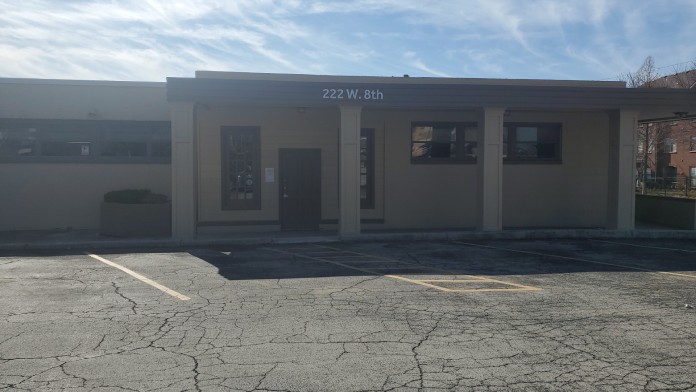
About Palmer Continuum of Care
Palmer Continuum of Care is based in downtown Tulsa, Oklahoma. They offer three main programs which target substance use disorder from different angles. The first is their outpatient counseling program for adolescents (ages 7 to 17) and adults who are experiencing addiction. They then run a school-based prevention program which intervenes for at-risk youths to keep them on the right path.
Finally, they have a residential program for women, mothers, and mothers-to-be in the Tulsa Women and Children’s Center (TWCC), located just 10 minutes northeast of their main building.
They don’t provide detox or medication assisted treatment services, but can refer you to alternative treatment centers should the need arise.
Personalized Counseling with a Convenient Schedule
The outpatient program begins with a thorough assessment and a treatment plan that molds to your circumstances. Adolescents’ families are heavily involved with the treatment planning process. This ensures meeting hours are at accessible times and that the care team is aware of any factors that could inhibit healing.
Counseling can take the form of individual, group, or family sessions. They’re available in English and Spanish.
Palmer offers sessions at all hours of the day to help you fit them into your schedule regardless of work hours, school hours, or other commitments. Typically, clients participate in the outpatient program for four to six weeks, but this can easily be adjusted to meet your needs.
In between sessions, feel free to exercise and unwind. Local highlights like the Tulsa River Parks trail system aren’t too far away.
Residential Care Designed for Mothers
Their residential program provides a safe and structured environment for up to 52 women, with space to accommodate children younger than 12 years. Your children will be cared for by a specialized team while you attend counseling sessions or parenting skills classes.
The residential care team can also provide therapy relating to trauma, domestic violence, and any other challenges you’re living through.
| Levels of Care | Detox Service Setting | Programs | Payment Options |
|---|---|---|---|
|
Inpatient and residential programs provide round-the-clock medical and emotional support as you live at the treatment facility. This level of care may be recommended if you have severe addictions or mental health conditions since it removes outside distractions and allows you to focus solely on therapy. |
In outpatient therapy, you’ll attend therapy sessions several times each week while living at home. This is ideal if you have a strong support system and a lower risk of relapse. Outpatient treatment offers flexibility to maintain work, school or family obligations. |
||
|
Inpatient detox occurs in a dedicated treatment facility. You’ll live there around the clock and receive intensive medical support and supervision to help manage your withdrawal symptoms. It is suitable for individuals with moderate to severe addictions as it ensures a stable detox environment. |
Outpatient detox gives you access to medically supervised withdrawal services while still allowing you to live at home. You’ll attend a clinic for treatment and monitoring. This flexible option is suitable for those with mild to moderate withdrawal symptoms who have strong support systems. |
||
|
Alcohol detox programs offer medical support to help individuals withdraw safely from alcohol. Your care team may use medications to ease your symptoms and provide medical monitoring to address complications. |
Drug detox programs support individuals who are withdrawing from addictive substances like cocaine and heroin. Medical support helps you manage symptoms in a controlled and safe environment so you can achieve initial sobriety. |
||
|
Private Insurance
|
Self Pay
|
Levels of Care
Inpatient and residential programs provide round-the-clock medical and emotional support as you live at the treatment facility. This level of care may be recommended if you have severe addictions or mental health conditions since it removes outside distractions and allows you to focus solely on therapy.
In outpatient therapy, you’ll attend therapy sessions several times each week while living at home. This is ideal if you have a strong support system and a lower risk of relapse. Outpatient treatment offers flexibility to maintain work, school or family obligations.
Detox Service Setting
Inpatient detox occurs in a dedicated treatment facility. You’ll live there around the clock and receive intensive medical support and supervision to help manage your withdrawal symptoms. It is suitable for individuals with moderate to severe addictions as it ensures a stable detox environment.
Outpatient detox gives you access to medically supervised withdrawal services while still allowing you to live at home. You’ll attend a clinic for treatment and monitoring. This flexible option is suitable for those with mild to moderate withdrawal symptoms who have strong support systems.
Programs
Alcohol detox programs offer medical support to help individuals withdraw safely from alcohol. Your care team may use medications to ease your symptoms and provide medical monitoring to address complications.
Drug detox programs support individuals who are withdrawing from addictive substances like cocaine and heroin. Medical support helps you manage symptoms in a controlled and safe environment so you can achieve initial sobriety.
Contact

Hayley’s love of writing started with exploring the wondrous world of Narnia and slowly grew into a desire to help others through practical, accessible writing. She writes about detox to bridge the gap between the lost, who aren’t sure where to turn, and the people willing and able to help them.

Peter W.Y. Lee is a historian with a focus in American Cold War culture. He has examined how popular culture has served as a coping mechanism for the challenges and changes impacting American society throughout the twentieth century.




